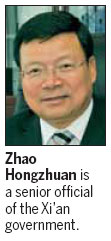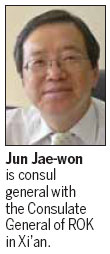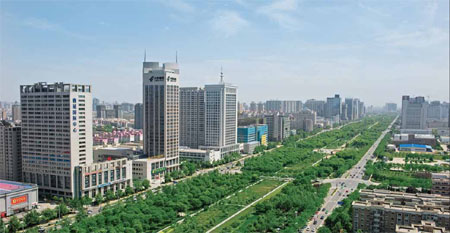Flash forward to the future

| A shot of a part of Xi'an High-tech Industries Development Zone. Provided to China Daily |

Xi'an steals a march over other western cities with Samsung chip project
For Zhao Hongzhuan it was a dream come true in April when consumer electronics major Samsung Electronics Co decided to make its biggest-ever overseas investment of around $7 billion (5.52 billion euros) in Xi'an. A mixed feeling of anxiety, pressure and excitement had gripped Zhao in the days preceding, as he was unsure whether the largest foreign investment by value in western China would bypass Xi'an for other locations such as Chongqing. But what he was sure about were the benefits that the project would bring to the capital of Shaanxi province. "Samsung has come, and so will other large multinationals," says Zhao, a senior official of the Xi'an government and the director of the administrative committee of Xi'an High-tech Industries Development Zone.
According to the Memorandum of Understanding, Samsung Electronics will build a NAND flash factory in the Xi'an high-tech zone. The factory is scheduled to produce the chips widely used in smartphones and tablet computers by the end of next year.
"The project will not only reshape the semiconductor industry in Xi'an, but also bring momentum to the city, which has set a goal of becoming an international metropolis by 2020," Zhao says.
In the glory days of ancient China, Xi'an was the capital of the Tang Dynasty (AD 618-907) and the biggest metropolis worldwide with nearly 1 million population. But in modern China, the city's glory has often been overshadowed by the coastal cities in East China and to some extent by its peers in the west.
Despite being referred to as China's western delta with Chengdu, the capital of Sichuan province and Chongqing municipality, Xi'an is perceived as the least attractive destination among the three for large multinational companies. Both Chongqing and Chengdu have more than 200 Fortune 500 companies whereas Xi'an has 80.
Changing fortunes
Zhao says the lack of mega projects has been the main reason for Xi'an to lag in economic growth as well as in attracting foreign investment. "Huge projects attract a great number of satellite companies. The Samsung investment is testimony to other big names that Xi'an is the place to be in," he says.
In 2011, the size of the economy, in terms of GDP, in Xi'an, Chengdu and Chongqing were 386.4 billion yuan ($60.78 billion, 47.89 billion euros), 685.5 billion yuan and 1 trillion yuan respectively. In terms of foreign direct investment, Xi'an saw a 30 percent year-on-year increase to around $2 billion in 2011 while Chongqing's FDI hit a record of more than $10 billion in the same year.
To catch up with Xi'an's peers in the west, Zhao was determined to lure Samsung in as soon as he heard in late March last year that the company had a plan to house a multibillion-dollar project in China. Various sources Zhao talked to indicated that Samsung had started evaluating 11 cities in China.
Xi'an was not on Samsung's initial list, and it did not come as a big surprise for Jonathan Story, emeritus professor of International Political Economy at INSEAD, one of the world's leading and largest graduate business schools.
As a matter of fact, Xi'an was not on Story's list either when he published an investment guide named Winning China's Markets in 2010, which introduced dozens of promising business regions in China, including Chengdu and Chongqing, to European companies.
"It is difficult for a city to earn a good reputation, and a project like Samsung's can be an excellent start," he says.
Just like other cities in western China, Xi'an clearly has its advantages in manufacturing, given the macroeconomic context of rising labor and other costs in coastal China.
Adam McWhirter, corporate general manager of Chengdu-based Maxxelli Real Estate, which focuses on the relocation of multinational companies, is expecting the same dynamic shift to boost his company's business in Xi'an in the near future.

The company has already seen a 40 percent to 50 percent increase in its multimillion-yuan business during the first quarter of this year. "A growing number of companies are moving to western China to avoid rising costs," says McWhirter, who opened the company's seventh office in Xi'an last year.
Though the Xi'an operation contributes only a small part of Maxxelli Real Estate's revenue, which is mostly generated by the company's Chengdu and Chongqing operations, McWhirter says with Samsung coming to the city, it is only a matter of time before other multinationals follow suit.
"If you look at all the second-tier cities in China, Xi'an makes a lot of sense," he says, adding that like Chongqing and Chengdu, Xi'an also has a lot of tax incentives and preferential policies, which are also essential parts of the government's go-west campaign.
Apart from the low-cost advantage, to turn an inland city into a manufacturing hub and a magnet for investment also requires a well-developed logistics system, says Jan Buiter, a member of the China Advisory Council, an advisory body to the European Commission on European economic policy vis-a-vis China.
The Rotterdam-based Buiter, who has worked in the Chinese shipping industry for more than 30 years, says the reason why China's coastal cities, such as Shanghai, are more developed than inland cities lie in their excellent hinterland connections by river barges and railways.

For Buiter, Chongqing's rapid economic development, which ranked first in China in 2011 with a 16.5 percent year-on-year increase in its GDP, largely depends on its mature logistics system.
As the largest inland port on the upper Yangtze River, Chongqing is able to move goods across China relatively cheaply. The opening of the Eurasian Land Bridge railway has significantly reduced the freight shipment time with Europe and put Chongqing in a favorable position to attract manufacturers.
Transport links
Though Xi'an has no river to move cargo across China, it is on the route of the Eurasian Land Bridge railway, which connects Lianyungang port in East China's Jiangsu province to distant Belgium.
The central and local governments have been making a lot of efforts to improve the infrastructure of the city. Shaanxi province had built the most expressways in western China by 2011 and plans to spend 170 billion yuan to build more to use Xi'an's strategic location.
The city, located in the center of China, is also within easy reach of 17 cities with a population of 700 million, all of which lie within a 1,000 km radius.
For Zhao from the development zone, low costs and maturing infrastructure enable Xi'an to enter a new stage of growth with Samsung's investment. But putting Xi'an on Samsung's list was a challenge.
Jun Jae-won, consul general with the Consulate General of the Republic of Korea in Xi'an, says that the majority of Koreans see Xi'an as a tourist attraction rather than a business destination. As many as 170,000 out of the around 1 million international tourists in Xi'an in 2011 were from the ROK.
But Jun sees much more in Xi'an. A month before he officially took charge of his position in the city last September, Jun took the initiative and went to Beijing to visit senior officials in Samsung's China headquarters.
"They knew very little about the city except for its smog in the winter. But from the research I did on Xi'an, I know it is also famous for its large number of universities and research centers," Jun says.
Apart from Jun, Zhao from the development zone as well as other top officials in Shaanxi province also visited Samsung's China headquarters last summer and found out that the company's investment in China was going to be a flash memory factory.
"It is like tailor-made for Xi'an because the city has had a solid foundation for the development of the electronic information industry, which is made up of more than 2,600 companies," says Zhao, adding the advantages that Xi'an has in this sector lie in its local talents.
Talent pool
In Xi'an, as many as 200,000 college students graduate every year. There are also around 40 colleges and universities equipped with courses in electronic information as well as 50 electronic information research institutes in the city.
According to Samsung's press statement, the large number of university and research institutes, and therefore the large number of local talent, was one of the key reasons for the company to chose Xi'an over other cities.
Fu Hui, managing director of Intel Mobile Communications Technology, a design firm for 3G base band chips, says without the huge talent pool in Xi'an, it was impossible for the company to grow the number of its technicians from 180 to 260 over the past year.
"Xi'an is no doubt the incubator for IT talents in China, but it used to be difficult to keep them after they graduated," says Fu, adding that his company's top challenge five years ago was to prevent its employees from going to top-tier cities such as Beijing and Shanghai.
"The situation has changed since 2008 when Xi'an's economy started to take off and more companies, such as Intel, came to the city, offering more choices to local talents," he says, emphasizing large projects, such as Samsung's will attract more talents from coastal cities back to the city.
Dong Xiaotai, HR service manager of the high-tech development zone in Xi'an, who has been working with Samsung Electronics to hire people for the project, says an increasing number of people are now interested in working in the city.
"We have decided to hire people from other cities for the Samsung project, to prevent poaching of employees from other companies in Xi'an. The attractiveness of Xi'an and Samsung is beyond my expectations," says Dong, adding that he is on his way to job markets in Suzhou, Dalian, Shenzheng and Chengdu to hire talent.
It is expected that Samsung will hire a large number of local people, from managers to technicians, for this project. Official statistics from the Shaanxi government suggests that as many as 13,000 job openings will be created by the company's investment in Xi'an.
Satellite push
The increasing attractiveness is not just for talent. Samsung's huge investment in Xi'an is also set to attract other satellite companies to the region.
In nearby Chongqing, Hewlett-Packard, the world's largest notebook PC maker, has had a great run since 2010, building the municipality's PC industry from scratch.
Large high-tech product manufacturers, Foxconn Technology Group, Quanta Corporation and Inventec Corporation, have all followed HP to Chongqing, which is poised to become the largest PC manufacturer in the world with an annual production capacity of 100 million units by the end of 2015.
Zhao from the Xi'an high-tech development zone is expecting Samsung's project to do the same trick in his city. He says that dozens of Samsung's suppliers have contacted the zone and as many as 13 of them have confirmed plans to invest in the city.
"The US-based Air Products is one typical example. We invited them to invest in the zone last year and they were reluctant to do so. But around 15 days after Samsung made its announcement, the US company came to us again with an investment plan," Zhao says.
Air Products, a worldwide supplier of industrial gases and performance materials, equipment and services, announced the grand opening of an engineering office in Zhao's zone in late April.
Its official statement said the company "has already signed a number of new customers in the region". The company said it has been serving Samsung Electronics for more than 20 years.
The hesitation by foreign multinationals to invest in Xi'an is rooted in some ground realities.
Xi'an made it to Samsung's final list with Beijing and Chongqing after a number of meetings between Shaanxi government officials and senior management of Samsung in December.
But Samsung didn't reach its decision until mid-March, says Jun from the Consulate General of the Republic of Korea in Xi'an. "It was a very difficult decision for them to make," says Jun, who went back to Seoul in mid-March to visit Samsung's senior officials only to find that they were still weighing Xi'an's pros and cons.
Shifting gears
Their top concern about Xi'an is that the city lacks the experience of handling big projects from multinationals, he says.
The government's ability to manage a project of such a big scale is one concern. The lack of an international environment, such as international schools and international hospitals, is another, Jun says.
"There will be at least 1,000 Koreans moving to Xi'an with their families, who are not only from Samsung but also from its Korean suppliers," he says, adding the city, which hasn't had its "foreign invasion" yet doesn't seem quite ready to embrace such a large expat community.
Zhao from the development zone says before Samsung's $7 billion investment, the largest foreign investment Xi'an had received was worth $600 million.
"They did have concerns in March and wanted to talk to government officials again. So we set up a meeting with the governor and vice-governor of Shaanxi province for them the following day after receiving their requests," he says.
Kwon Oh-hyun, CEO of Samsung Electronics, says: "Their great enthusiasm was so impressive that it triggered our final decision".
But enthusiasm alone is not enough for attracting large multinational companies, says Klaus Reitze, a German in his 60s who has been living in Xi'an for 14 years.
Reitze, who runs RPC Reitze Project Consultancies, a company that bridges German investors with the Xi'an government, said that the mindset of the government officials is far from international.
Chengdu has learned a lot from its rich experience of dealing with multinationals and developed a proactive and efficient system, which includes a quarterly meeting between the city's mayor and representatives of all the foreign enterprises in the city.
Zhao says that to advance Samsung's project, three offices of the provincial, municipal and the development zone levels have been set up.
Even Reitze, who hasn't been very successful in attracting German investors to Xi'an, sees Samsung's investment as a turning point.
"In about two to three years, the penny will drop. There is no way I will leave Xi'an," Reitze says.
mengjing@chinadaily.com.cn
(China Daily 06/22/2012 page16)
Today's Top News
- Xi calls for promoting volunteer spirit to serve national rejuvenation
- Xi chairs CPC meeting to review report on central discipline inspection
- Reunification will only make Taiwan better
- Outline of Xi's thought on strengthening military published
- Targeted action plan to unleash consumption momentum
- Separatist plans of Lai slammed































